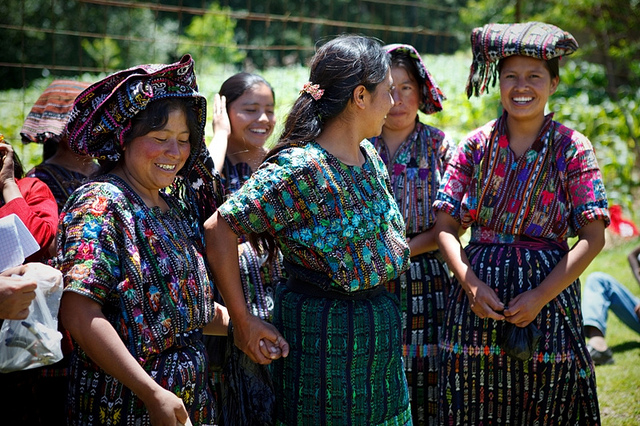Guatemala 2013 trip diary: Mercado Global
By Lauren McCarthy
Minneapolis (MN)
We visited Mercado Global on Wednesday and saw a different side to traditional Mayan weaving. Mercado Global has 31 cooperatives with about 340 women across Guatemala. It is a fair trade fashion nonprofit that sells wholesale to Anthropologie, Lucky Brand Jeans, Levi’s, Red Envelope, Henri Bendel, Calypso, and some Japanese retailers, among others. Although it is based in New York, the bulk of the staff are in and around Panajachel. Mercado Global’s immediate goal is to double its number of cooperatives/women in the next year but its larger objective is to change how the fashion industry operates, especially since the majority of workers in the industry are low-paid women.
Something distinctive about Mercado Global, in contrast to MayaWorks and Thirteen Threads, is that the technique is the same (such as back strap weaving) but the women are given (and sometimes help develop) a design that in itself is not necessarily traditional and many of the colors are specified to Western tastes. For instance, when we saw some of the finished product for the spring 2014 line of handbags, teal was a prominent color and the fabric itself was aligned in ways we had not seen from previous artisans. The women in our group were positively swooning over the bags, which should be available on Mercado Global’s website for spring.
As part of our visit, we traveled by van to the village of Patzun, which necessitated some advanced driving skills on the part of our drivers. They had to navigate some places that had clearly been affected by landslides and did a bit of water driving over a little creek. Adventurous us!
In Patzun, we were warmly greeted by Lilian, who is part of a cooperative that sells its textiles to Mercado Global. There were about ten women present, as well as a few of their children We introduced ourselves and shared our ages and number of children. The women in cooperatives that work with Mercado Global receive community training on topics like child and adult health and nutrition, with foci on how to purify water, exercises to do to relieve the body of pain when working on weaving, and preventive medicine. Cooperatives also receive training on technical skills, leadership and self esteem, and business and finance development. Coops do different stages of the product (some weave, others sew, etc). Quality control and uniform production is a key part of onboarding a new coop because it is a different mentality between the two cultures. For the Maya, what is unique is valuable, but for the fashion industry, uniformity is key to successful sales to clothing companies.
There was a lot to learn and see with Mercado Global, especially since it added yet another lens to how we as Westerners and clothing consumers can understand and influence the fashion industry.

